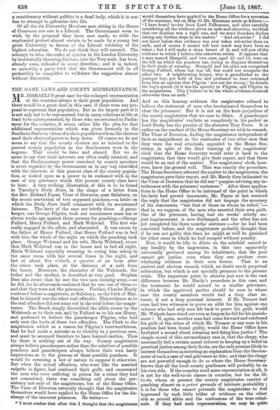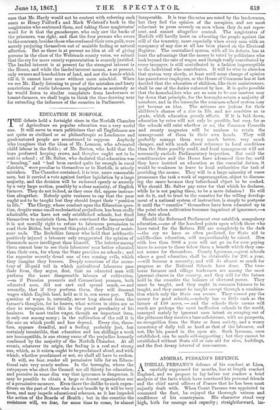THE GAArF , LAWS AND COUNTY REPRESENTATION.
14R. DISRAELI'S great case for the enlarged representation ill of the counties always is their great population. And there would be a great deal in this case, if there were any pro- posal to represent that population. But as the largest part of it is not only not to be represented, but in many relations of life at least to be misrepresented, by those who are returned to Parlia- ment for the counties, it seems rather like the plea for that additional representation which was given formerly to the Southern States in virtue of a slave population whom the electors used their electoral power to keep down. Of course we do not mean to say that the county electors are as inimical to the poorest county population as the Southerners were to the negroes. That would be false and absurd. But we do mean to say that their interests are often really inimical, and that the Parliamentary power exercised by county members is never regarded by the Government as in any way identified with the interests of this poorest class of the county popula- tion, or looked upon as a power to be reckoned with in the case of any grievance which this poorest county class have to bear. A very striking illustration of this is to be found in Tuesday's Daily News, in the shape of a letter from the Rev. Richard Payne, Vicar of Downton, near Salisbury, on the recent conviction of two supposed poachers,—a letter on which the Daily News itself comments with its accustomed fairness. The facts of the case are briefly these. A game- keeper, one George Pilgrim, took out summonses some ten or eleven weeks ago against three persons for poaching,--George Fulford, Henry Fulford, and Mark Welstead. The first was really engaged in the affair, and absconded. It was sworn by the father of Henry Fulford, that Henry Fulford was in bed with him the whole of the night on which the poaching took place. George Welstead and his wife, Maria Welstead, swore that Mark Welstead was in the house and in bed all night, Maria Welstead especially swearing to seeing him asleep in the same room with her several times in the night, and last at about five o'clock, a quarter of an hour after the crime took place, at the distance of a mile from the house. Moreover, the character of the Welsteads, the father and the mother, is described as very good. Stephen Deer also swore that he saw the two men running away,—as he did, for he afterwards confessed that he was one of them,— and that they were not the prisoners. Further, Charles Moody confessed before a magistrate, at Salisbury, on the 14th of May, that he himself was the other real offender. This evidence as to the real offenders did not come out in the trial before the magis- trates. The Bench simply discredited the alibis sworn by the Welsteads as to their son, and by Fulford as to his son Henry, and professed to believe the gamekeeper Pilgrim, who had only seen the backs of these two offenders. The Clerk to the magistrates added as a reason for Pilgrim's trustworthiness, that he had made a mistake as to identity in a previous case, and must be assumed therefore to have learned caution. Thus far there is nothing out of the way. County magistrates always believe gamekeepers rather than the relatives of possible poachers, and gamekeepers always believe their own hasty impressions as to the persons of these possible poachers. It would be reversing a law of nature to suppose it otherwise. But when the actual offenders, who were like the asserted culprits in figure, had confessed their guilt, and exonerated the men who were suffering in prison for a crime they had not committed, there was something odd about the per- sistency not only of the magistrates, but of the Home Office. The Vicar of Downton naturally thought that the magistrates themselves would have applied to the Home Office for the dis- charge of the innocent prisoners. He writes:— I must confess that after this I thought that the magistrates
would themselves have applied to the Home Office for a reversion• of the sentence, but on May 23 Mr. Hinxman wrote as follows
I have heard to-day from Lord Folkestone, and after carefully considering all the evidence given on oath and otherwise, we think that our decision was a right one, and we must therefore decline taking any further steps in the matter.' And otherwise P I did- not know before that evidence was ever taken otherwise than on oath, and of course I cannot tell how much may have been so taken ; but I will make a clean breast of it, and tell you all the evidence to which I believe this otherwise refers. It appears that a man named Shergold, and two %tons, aged 20 and 14, were on the hill up which the poachers ran, trying to disguise themselves- in their mode of running. Shergold and his elder son recognized George Fulford, whose hat was off, but could not recognize the other two. A neighbouring keeper, who is grandfather to the- younger boy, got hold of him and professed to have extracted' from him an opinion that Pilgrim ' was not far wrong ;' he details the boy's speech (if it was his speech) to Pilgrim, and Pilgrim to- the magistrates. This I believe to be the whole evidence obtained otherwise than on oath."
And on this hearsay evidence the magistrates refused to- believe the statement of men who incriminated themselves to- clear the prisoners! But it is not on the keen prejudices of the county magistrates that we care to dilate. A gamekeeper- has the magistrates' verdicts as completely in his pocket as Lord Derby has the proxies of the absentee Tory Peers. It is rather on the conduct of the Home Secretary we wish to remark. The Vicar of Downton, finding the magistrates independent of facts so insignificant as the confession of two other men that they were the real criminals, appealed to the Home Sec- retary, in spite of the kind warning of the magistrates' clerk that the Home Secretary would refer it back to the magistrates, that they would give their report, and that there- would be an end of the matter. The magistrates' clerk, how- ever, knew his ground well. This was exactly the procedure. The Home Secretary referred the matter to the magistrates, the- magistrates gave their report, and Mr. Hardy then intimated to- the Vicar of Downton that he did not " purpose advising any in- terference with the prisoners' sentences." After three applica- tions to the Home Office to be informed of the point in which. his facts had proved inaccurate, Mr. Payne at last received the reply that the magistrates did not impugn the accuracy- of his statements, "but that of those on whom he relied,"— that is, we suppose, of the men who asserted their own guilt. One of the prisoners, having had six weeks' utterly un- just imprisonment, is now discharged, and the other has not yet completed his three months' sentence ;—for he had been convicted before, and the magistrates probably thought that if he was not guilty this time, he might as well be punished for other cases in which he had escaped without penalty.
Now, it would be idle to dilate on the mischief caused in any locality by the impression, in this case apparently universally produced among its inhabitants, that the poor cannot get • justice, even when they can produce over- whelming evidence in their own favour. That is an ancient and obvious remark, which no doubt needs perpetual reiteration, but which is not specially germane to the present crisis. The important point to observe just now is the vast difference between Mr. Hardy's procedure in this case, and the treatment he would accord to a similar grievance, in which the aggrieved parties should be men in whose case the county members would feel a deep class in- terest, if not a deep personal interest. If Mr. Toomer had even had two witnesses to prove an alibi for him against one- witness who had only seen his back to prove his guilt, would Mr. Walpole have stood out even as long as he did for his punish- ment ? If, again, another man had come forward and confessed his guilt of the crime of which Mr. Toomer or any man in his position had been found guilty, would the Home Office have- hesitated a second about releasing and doing him. justice ? The- simple moral of this extraordinary case is, that the clergy, who, necessarily feel a certain moral interest in keeping up a belief in practical justice among their flocks, are the only persons likely to interest themselves in extorting an explanation from the Govern- ment of such a case of real grievance as this; and that the clergy' are not powerful enough to do so where the Home Secretary knows that all the local county gentlemen will probably be on his own side. If the counties need more representation at all, it is not for the well-to-do classes in counties, but for the ill- to-do, whom at present the county magistrates convict of poaching almost on a priori grounds of intrinsic probability ; it is for those who cannot persuade the magistrates to feel impressed by such little trifles of evidence on the 'other side as proved alibis and the confessions of the true crimi- nals. If they had sneh representation, we may be quite
sure that Mr. Hardy would not be content with referring such cases as Henry Fulford's and Mark Welstead's back to the magistrates who sentenced them, and taking those magistrates' word for it that the gamekeeper, who only saw the backs of the prisoners, was right, and that the four persons who swore to the contrary, besides those who confessed their own guilt, were merely perjuring themselves out of amiable feeling or natural affection. But as there is at present no idea at all of giving persons in the class of the Welsteatis county votes, we submit that the cry for more county representation is scarcely justified. The landed interest is at present far the strongest interest in the House, and while the landed interest means, as at present, only owners and leaseholders of land, and not the hands which till it, it cannot have more without more mischief. When we see Mr. Hardy listening to proof of the mistaken and hasty convictions of rustic labourers by magistrates as anxiously as he would listen to similar complaints from landowners or tenant-farmers, we shall begin to think the time drawing near for extending the influence of the counties in Parliament.































 Previous page
Previous page